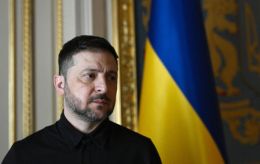Pistorius declines to run for position of Chancellor of Germany
 Boris Pistorius, Germany's Minister of Defense (photo: Getty Images)
Boris Pistorius, Germany's Minister of Defense (photo: Getty Images)
German Defense Minister Boris Pistorius has decided not to run for the position of federal chancellor in the upcoming snap elections. Earlier, members of the Social Democratic Party of Germany (SPD) had urged him to enter the race, reports Reuters.
Germany’s snap elections are set for February 23, and in mid-November, it was revealed that the Social Democratic Party (SPD) of current Chancellor Olaf Scholz had considered nominating Defense Minister Boris Pistorius for the position. Pistorius enjoys higher popularity than Scholz among voters.
However, the ruling SPD is already trailing in the polls, ranking third behind the opposition conservatives and the far-right.
Today, November 21, Pistorius announced he would not run in the upcoming elections.
"I have just informed our party and parliamentary group leaders that I will not be standing as a candidate for the office of federal chancellor," the defense minister said in a video posted on the SPD’s platform.
Pistorius emphasized that this was his sovereign and entirely personal decision.
Scholz's party considered Pistorius a favorite
Traditionally, the incumbent chancellor has always been the strongest candidate to lead their party into the next election. However, the sharp difference in popularity between Olaf Scholz and Boris Pistorius has sparked doubts within the Social Democratic Party (SPD).
According to Germany’s Spiegel, some SPD Bundestag members suggested during a closed meeting last week that the party should field Pistorius, not Scholz, as their candidate, citing the defense minister's greater popularity among voters.
This debate comes amid the collapse of Germany’s three-party traffic light coalition due to disagreements over economic policies.
Pistorius supported Scholz
On Thursday evening, Boris Pistorius offered his full support for Olaf Scholz for the first time, describing him as an outstanding federal chancellor.
"He has led a coalition of three parties through perhaps the biggest crisis in recent decades," the German defense minister said.
The SPD leadership is expected to push for Scholz’s official nomination as the party’s candidate for chancellor early next week, according to a party source cited by Reuters.
However, political analysts suggest that the recent lack of confidence in Scholz, even within his own party, places him at a further disadvantage compared to his main rival, Friedrich Merz, the conservative candidate for chancellor.
Collapse of the coalition in Germany and upcoming elections
Earlier this month, Germany’s ruling coalition collapsed after Chancellor Olaf Scholz dismissed Finance Minister Christian Lindner, a member of the SPD.
Following this, all SPD-affiliated ministers were relieved of their duties.
On November 8, German President Frank-Walter Steinmeier officially issued dismissal certificates to the ministers.
In response, Scholz expressed his readiness to put a confidence vote for his government before the Bundestag. Meanwhile, opposition parties are exploring the possibility of forming a new coalition with Scholz's party, but without him at the helm.
The upcoming snap elections in Germany could significantly impact not only domestic politics but also the country’s foreign policy, particularly its stance toward Ukraine. Further analysis is available in the article by RBC-Ukraine.

